Hi Everyone,

Note: British Olympic mascot Wenlock and Great Britain Team mascot Pride are looking over the houses of parliament and Big Ben. The picture also features sunburnt Snoopy Royal Guard and a White Walker Dragon. These characters are symbolic of the broad far-reaching nature of Brexit as well as fears of impending doom.
Today, I would like to investigate and provide some of my own insights into the events surrounding Brexit. As some of you may know, I am a British and Australian citizen currently living in Australia. Therefore, the events relating to Brexit have some significance to me. In fact, Brexit is such a significant event; it has implications that stretch well beyond just Britain and even the European Union.
In my opinion, Brexit has become unnecessarily complex. There are new developments almost every day but most of these do not bring a solution any closer. I will attempt, with the information and understanding that I have, to piece together what is actually happening as well as provide some insight into the possible outcomes.
Background
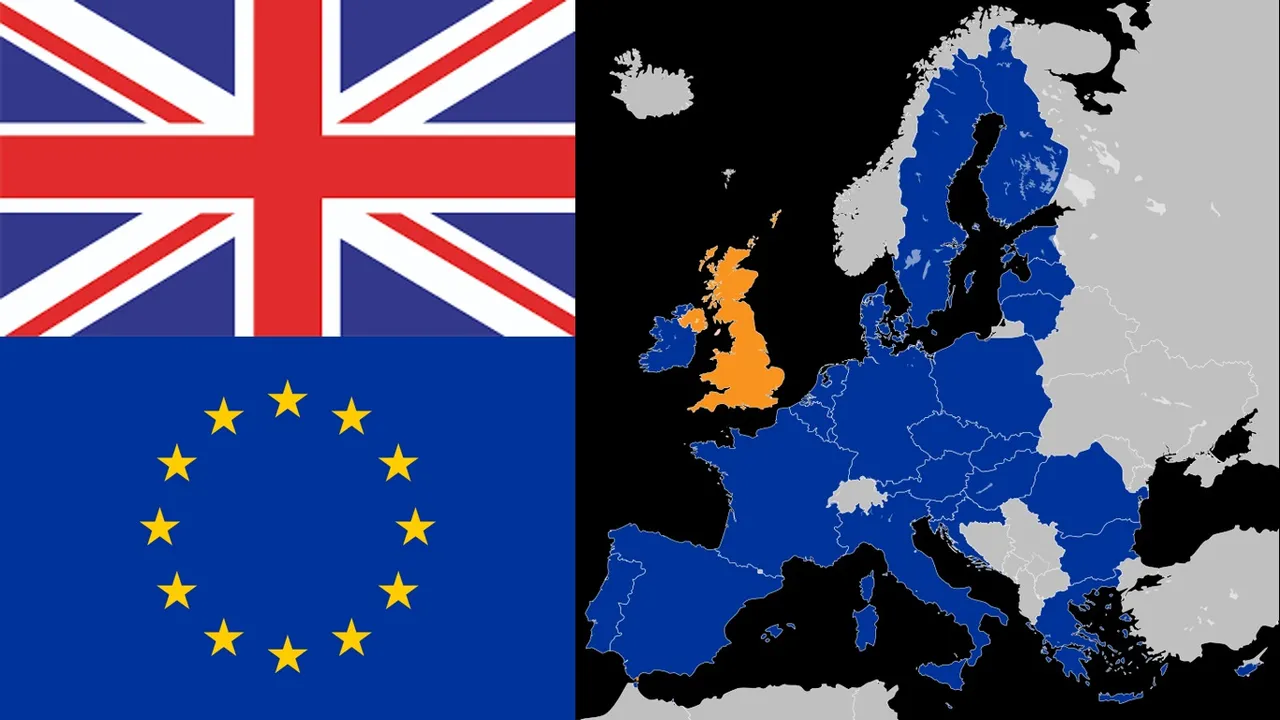
In June 2016, Britain had a referendum to determine if Britain should exit the European Union. Hence, the term ‘Brexit’ was invented (Britain + exit = Brexit). In 1973, Britain joined the European Union, which was, at that time, known as the European Communities. In 1975, Britain’s membership in the European Communities was endorsed by a referendum.
The European Communities of 1975 is very different from the European Union of 2018. In 1975, there were only 9 countries in the European Communities compared to 28 countries/states in 2018. Numerous treaties have been signed since 1975. These treaties include:
- Single European Act (1986)
- Maastricht Treaty (1992)
- Amsterdam Treaty (1997)
- Lisbon Treaty (2009)
I will not go into the details of each treaty but the general gist of the treaties was create a single common market for all members of the European Union. In 1999, because of the Maastricht Treaty, the European Union launched its own currency, the Euro. As of 2018, 19 of the 28 states/countries use the Euro as their National currency.
The changes made to the European Union has effectively created a pure free trade zone amongst all members. The changes made to the European Union has reduced the sovereignty of all its members. The members of the European Union are required to abide by its rules, legislation and governance. Those countries that have adopted the Euro have also lost control over their own monetary policy. Members have lost control over their borders. It is even possible that member countries will soon lose control over their own military (cyprus-mail.com). The media have also played a role in promoting distrust of migrants. Some people are afraid migrants will take jobs from British citizens and possibly pose a security threat.
The extent of control the European Union has over its members raises great concerns for several of its members. The concerns for Britain appeared sufficient to raise the question of whether to remain in the European Union. The decision was put in the hands of the public through a referendum.
The Brexit Referendum had a very high voter turnout of 72.21%. The 2015 and 2017, General Elections had turnouts of only 66.1% and 69.1% respectively. Almost 52% of the voters voted in favour of Brexit (Wikipedia).
The British Prime Minister, David Cameron, stepped down from office as he was strongly in favour of keeping Britain in the European Union. Theresa May replace David Cameron as British Prime Minister.
To leave the European Union, Britain invoked Article 50 of the Treaty of the European Union; the article was invoked on 29 March 2017. This gave Britain exactly 2 years to prepare to leave the European Union.
Leaving the European Union can be expected to have a significant impact on Britain’s trade with the European Union countries. In 2017, approximately 44% of all Britain’s exports went to the European Union and approximately 53% of Britain’s imports came from the European Union (researchbriefings.parliament.uk). However, these figures are likely to be overstated as some of Britain’s exports to the European Union are immediately exported out of the Union through ports such as Rotterdam.
Considering the extent of trade between Britain and the European Union, some form of trade agreement would be greatly beneficial for both Britain and the European Union. If no agreement can be struck, Britain and the European Union would most likely be trading based on World Trade Organisation (WTO) rules. Trade between Britain and the European Union would be hindered by tariffs and regulations. Infrastructure would need to be built and people would need to be hired to handle delays in freight and people movement.
There is also the potential problem of the Northern Island and Republic of Ireland border. After Brexit, Northern Ireland would be out of the European Union, whereas, the Republic of Ireland would remain. The European Union would most likely insist that the Republic of Ireland has a hard border with Northern Ireland. This border would be considered necessary to regulate movement of freight and people in accordance with WTO rules. Many would consider a hard border, as dishonouring the Good Friday Agreement, which was signed in 1998 and has been essential to keeping the peace in that region. A hard border would also have the negative impact of splitting up communities that freely move across the border for work, living or recreation. It is likely that such a border will face considerable opposition.
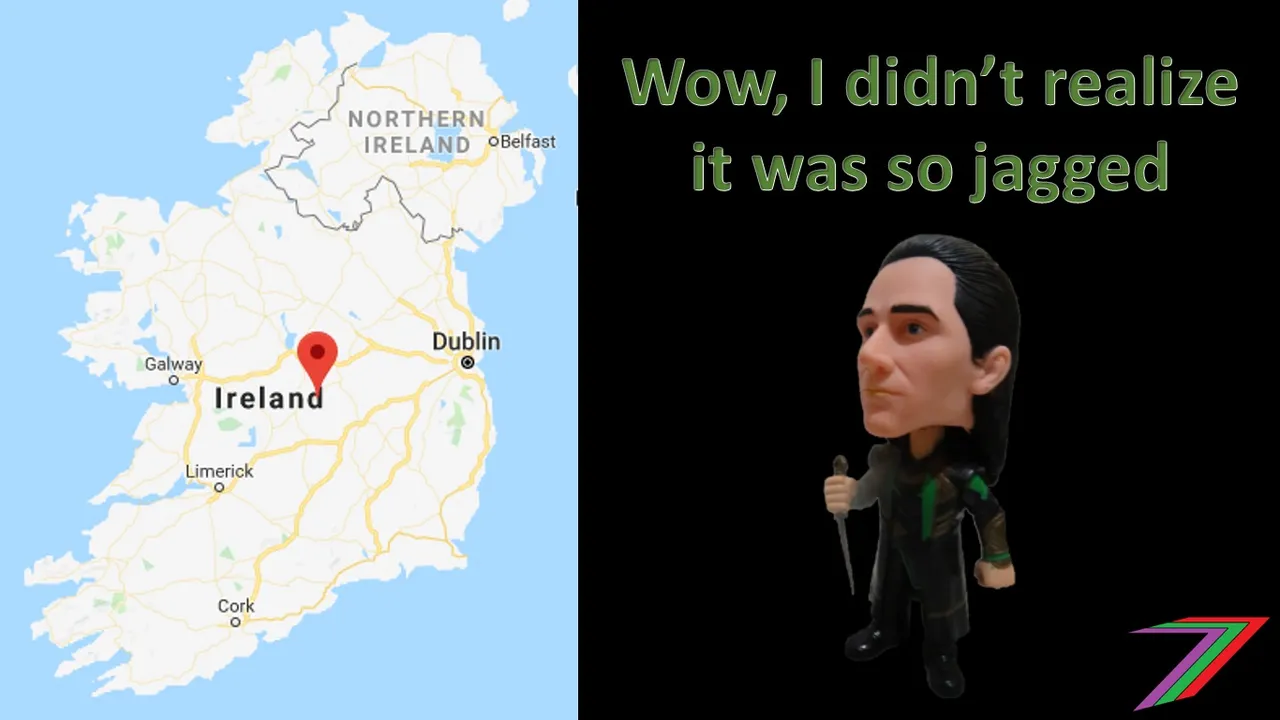
The possibility of a hard border between Northern Island and the Republic of Ireland was not clearly articulated to the people prior to the Brexit vote in 2016. Many British people cannot even identify where that border is, which clearly indicates the acceptance of free movement between the two Irelands (The Journal).
Where are we now?
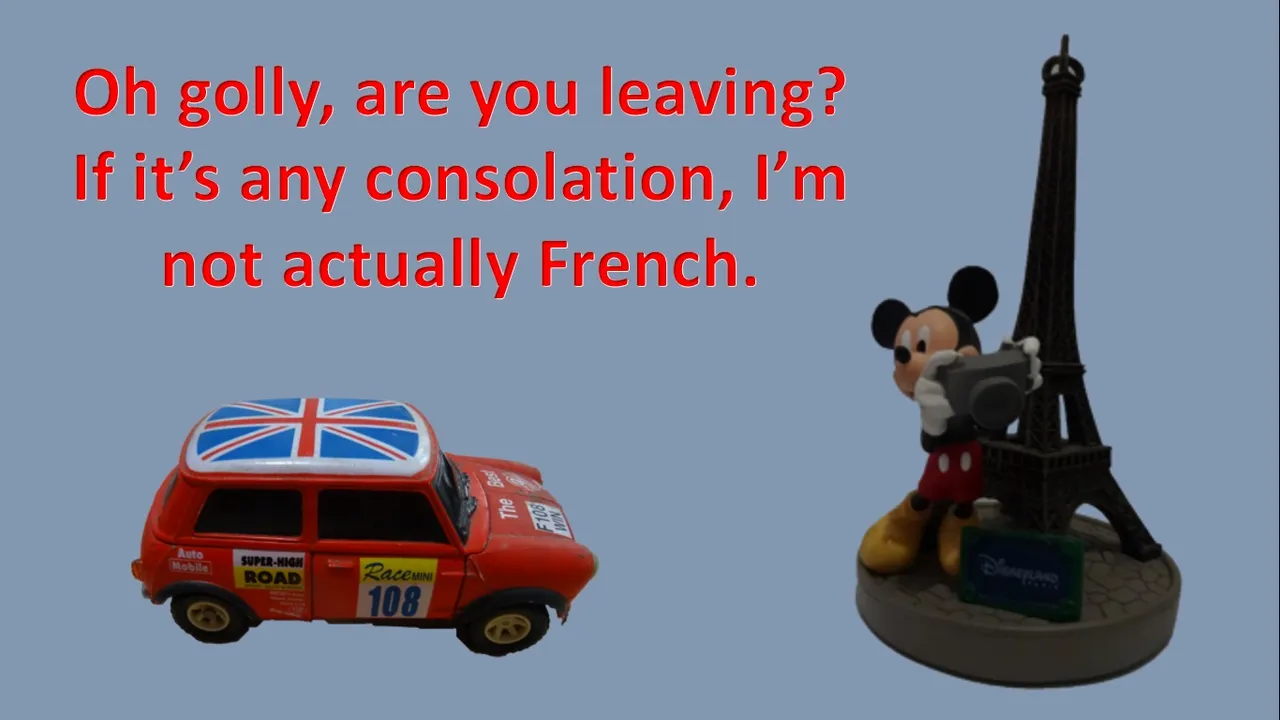
I write this post with less than two weeks before the end of the 2018 calendar year. So far, no Brexit trade deal has been finalised between Britain and the European Union. A deal has been brought back to the British Parliament but voting has been delayed until early 2019. The proposed deal, which is mostly ambiguous in regards to the future relationship between Britain and the European Union, appears heavily weighted in favour of the European Union.
My summary of the deal
In short, Britain will still need to comply with all European Union laws and regulations. They will not be able to influence any European Union laws and regulations. There does not appear to be a reliable guarantee of ‘no hard border’ between Northern Island and the Republic of Ireland. Britain would have to pay the European Union over £40 Billion. Britain should be able to have control over their own borders but information is still currently very vague. Britain is projected to be economically worse off than remaining in the European Union. The Brexit deal appears worse in almost every aspect than remaining in the European Union.
The proposed deal is very unpopular in parliament and is very unlikely to receive sufficient support to be implemented. There is also very little support for this deal from the public, according to a poll conducted by YouGov, less than 20% of those asked were in favour of the deal while 42% were opposed to it and the remaining respondents weren’t sure.
Tactics at play

I often write about game theory. There are several games and strategies currently at play with Brexit. Both Britain and the European Union are playing games. Are they playing games that involves working towards a common goal or are they working against each other for different goals.
Game played by Britain

Theresa May’s delay tactics regarding the current deal is an attempt to prevent any other possible deal with the remaining time before 29 March 2019. This pressures parliament to choose between her deal and no deal. Her deal is very unpopular but no deal Brexit is possibly even more unpopular.
Will the delay tactic work?
I believe that parliament will still vote against the deal. However, that does not necessarily mean that there will be a no deal Brexit, which has been insinuated by Theresa May. It will be too late for further negotiations with the European Union before March 2019 but there are several other possibilities other than ‘no deal Brexit’. These possibilities include:
- Second referendum on Brexit
- Referendum on the proposed deal or no Brexit
- Postponement of Brexit
- Cancelling Brexit
- General Election
All of the above options present problems. A second referendum on Brexit will spark outrage by many that supported Brexit in the first referendum. The outcome of the referendum could still be in favour of Brexit. If that is the case, we are back in the same position but with less credibility.
Referendum on the currently proposed deal or no Brexit will spark greater outrage as most supporters of Brexit are opposed to the deal. The referendum will likely have a very poor turnout. Protests are likely to follow regardless of the result.
Postponement of Brexit could give Theresa May or a new leader more time to renegotiate Brexit but we could still be back to the same position as we are in now with virtually the same deal. Postponement will aggravate many of the public that strongly desire Brexit to be finally resolved.
Cancelling Brexit will most likely have the strongest negative public response. It will be seen as betrayal of the people and democracy. The existing Government will most likely not last very long in power. We will most likely see widespread protests and disruption.
A General Election will cause further disruption to Brexit; I would assume that this would delay Britain from leaving the European Union. It is possible the same Government (Tory Party) will return to power, which will change nothing. If another party takes office (Labour Party), the same problems are most likely to remain as well. The Labour Party has offered very little in terms of a possible Brexit deal.
What does the British Government really want?
Theresa May entered negotiations from a position of weakness by adopting the attitude that a deal must be made and at almost any cost. This put the European Union at a very strong negotiating position as Britain have committed themselves to accepting something eventually. Britain should have been very clear that leaving negotiations without a deal is a possibility if the deal does not meet Britain’s requirements. No deal Brexit is also bad for the European Union as well. The pressure of a no deal would have pushed the European Union to be more accommodating to Britain’s requirements.
Based on interviews from officials in the European Union, Britain did not come with a clearly defined plan of what they wanted to achieve from a deal (Reuters). This has even further weakened their position to negotiate.
Britain entered Brexit negotiations with a Prime Minister who was not in favour of Brexit to begin with (Euronews). Immediately, this should raise doubts that an in earnest attempt was ever going to be made to obtain Britain a good deal for leaving the European Union. It is quite possible that the objective was to prevent Brexit or offer a Brexit that is very similar to remaining. In the current case, a similar but far worse situation than remaining is being offered.
Fearmongering regarding the extent of the plight to be caused by a no deal Brexit has been considerably ramped up by politicians, economists and the media. I believe this fearmongering is to get support for a second referendum (either option mentioned above).
Game played by the European Union

The European Union have been uncooperative and uncompromising in their negotiations, even though, it is becoming more apparent that the deal offered is not going to be accepted by parliament or is acceptable to the British people. A no deal Brexit will hurt the European Union. A good deal offered to Britain will also hurt the European Union, as other countries might want to leave as well, if Britain is thriving outside the European Union.
I believe the European Union want Britain to remain in the union. The European Union, even under a very favourable deal, are not likely to be better off than keeping Britain in the union. Britain is seen as important because of trade as well as the possible establishment of a European Union army.
The European Union most likely believes the poor deal offered to Britain is more likely to result in another referendum than a no deal Brexit. They are probably expecting the second referendum to produce an outcome against Brexit. If the referendum were for the proposed Brexit deal or no Brexit, either outcome would work quite well for them.
The current fearmongering from the British media and politicians probably provides the European Union with some assurance that a no deal Brexit is unlikely to happen.
Verdict
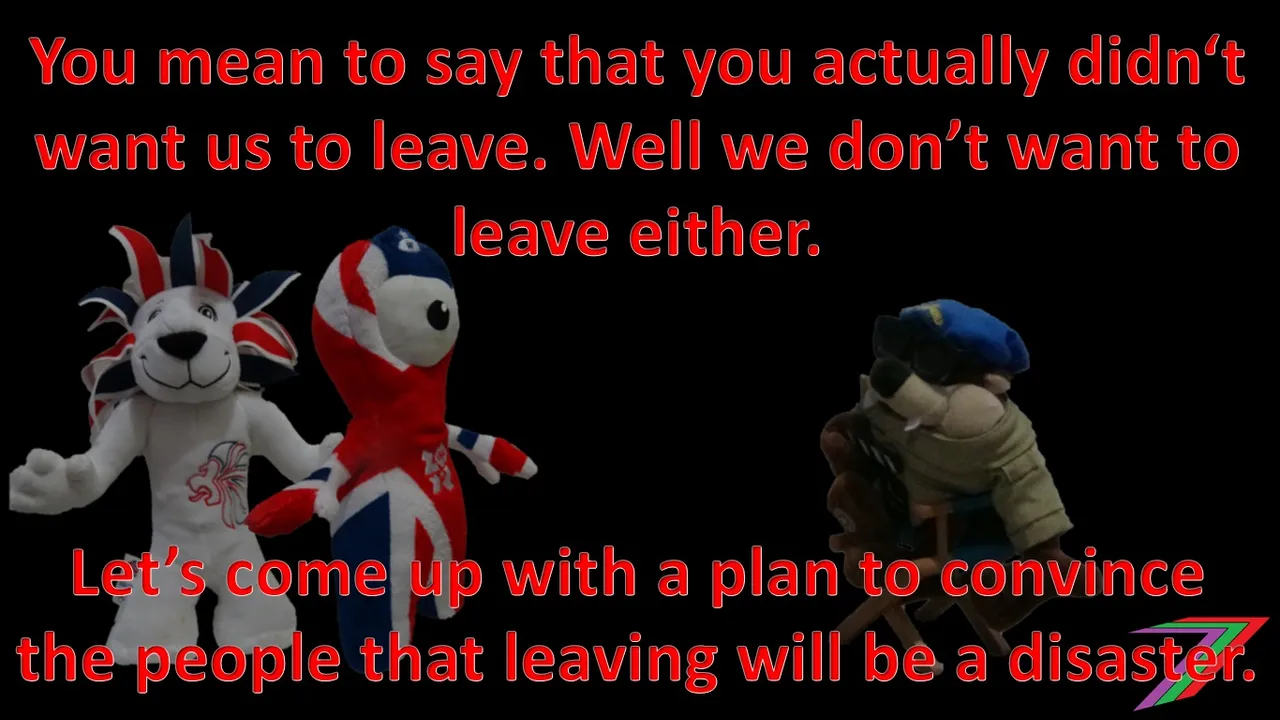
It appears both the British Government and the European Union do not want Brexit to go ahead. Britain has made leaving the European Union as painful as possible through poor negotiation, delay tactics and fearmongering. The European Union have been uncooperative, uncompromising and vague regarding reaching a deal, that the British public would find acceptable.
My opinion

I am pro-Brexit. I believe that Britain should be independent of the European Union. Britain should not be controlled by European Union laws and regulations. I also believe in free trade as well. I do not believe that countries need to be part of an economic or political block/union to be able to trade as freely as possible. I believe in the long-run, large unions such as the European Union are bad for free trade as they can become inward focused rather than open to trading to those outside of the union. Large unions can also be used to bully countries outside the union and control countries inside the union.
I believe Brexit has not been handled very well or in the best interests of the public. If we turn the clock back to the beginning of the Brexit negotiations, I would recommend using the Canada Plus relationship as a starting point for negotiations with the European Union. The hard border with the Republic of Ireland would have been strongly pushed for by the European Union. The extent of free trade can be argued to negate the need for a hard border. However, this would be a tough sell to the European Union, which clings very tightly to control of trade. A Canada Plus type of deal would also provide Britain with greater manoeuvrability to trade with other countries outside the European Union. Table 1, provides a brief comparison between the two deals.
Table 1: Comparing the key Brexit models: Chequers v Canada Plus
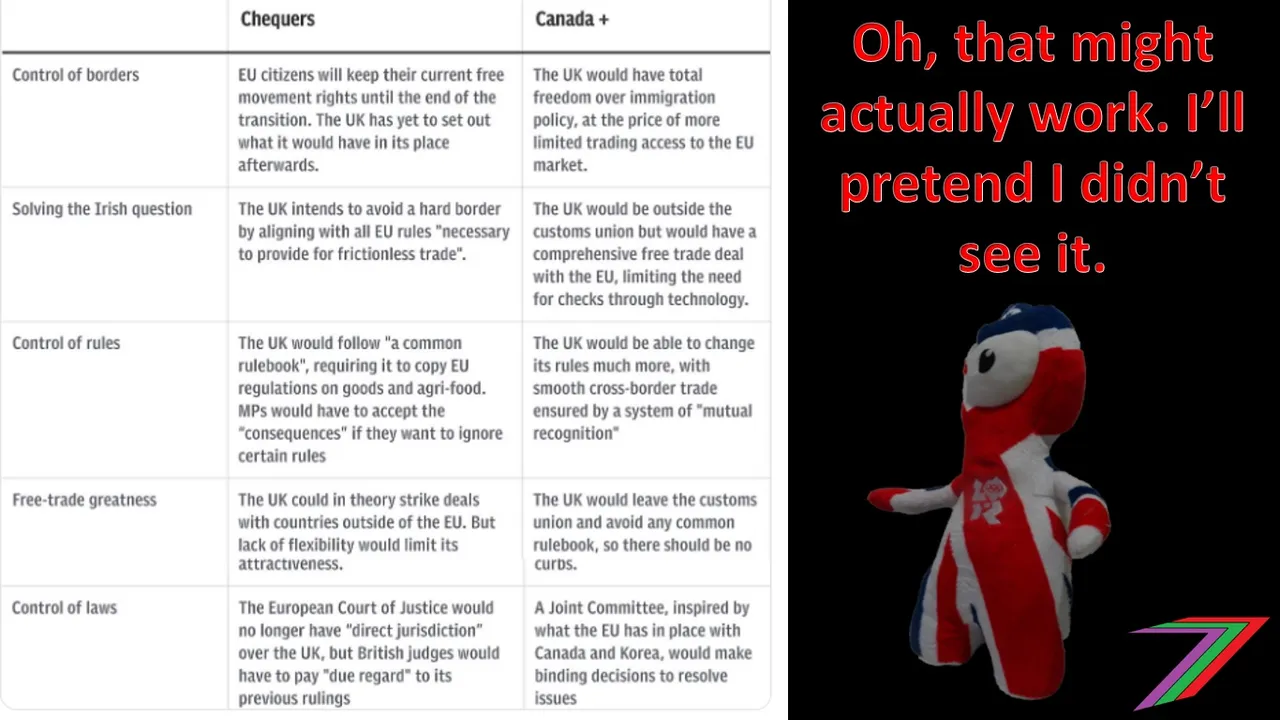
Source: The Telegraph
The version of the Canada Plus type of deal supported by Boris Johnson (former Foreign Secretary) is explained in more detail by The Week. The Canada Plus type of deal would be a struggle for agreement with the European Union. For such an agreement to be possible, the negotiators need to be ready to leave negotiations with a credible threat of a no deal Brexit. Credibility of this threat could be sufficient incentive for a deal to be struck. From the perspective of the European Union, a Canada Plus type of deal is still better than no deal.
Conclusion

Note: British Olympic mascot Wenlock is looking over Harrods across to Mickey Mouse in Paris. There is an aeroplane (Tigerair) departing Britain symbolic of the potential departure of migrants. The picture demonstrates the threat of potential trade and travel disruption from a botched exit from Europe.
A lot can still happen in the coming three months. Several possible paths can be taken if the current proposed Brexit deal is rejected, which is mostly likely the case. Most of these paths are unlikely to reach a particularly good outcome from Britain. The biggest fear is a no deal Brexit. The extent of the cost of a no deal is currently being exaggerated to push the public to favour the current deal or for them to want another referendum. A no deal Brexit will, without doubt, create many short-term problems but in the long-run, most of these can be overcome with trade deals with other countries such as China or the USA. Negotiations with the European Union for a trade deal can also recommence after an official no deal. These negotiations are likely to be more productive as the European Union can no longer strategize to keep Britain in the union.
Thank you for taking the time to read this post. I hope that you find my insights into Brexit to be useful. The next three months are going to be very interesting. I will post an update to this post sometime after 29 March 2019 to analyse what actually happens.
More posts
To access more of my content, you can click on the links below. These links will lead you to posts containing my collection of works. These posts will be updated frequently.








